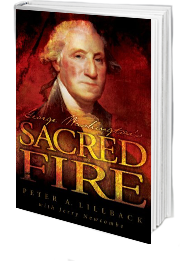The Constitution State
Jerry Newcombe:
Have you ever noticed a license plate from Connecticut which says the Constitution State? Why is that? We know the Constitution was written in Pennsylvania, not Connecticut. But the first fully developed Constitution written on North American soil was written in Connecticut. As we shall see, that Constitution was inspired by a sermon and it even mentions our Lord Jesus.
Dr. Os Guinness:
The covenant was all about the reciprocal responsibility of all for all. The rabbis call it the politics of love. You love the Lord your God with all your heart, soul, and strength; you love your neighbors yourself; and you love the stranger because you were a stranger in Egypt. Of course, it was rediscovered by Calvin, Zwingli, Knox. In Scotland, they call themselves the Covenanters. And the later word Whig, which became a word for freedom, is actually from the Scottish word Whiggamore, which was a Covenanter.
Dr. Os Guinness:
And so in England, Oliver Cromwell in the English Revolution, he says, Exodus is the direct parallel of what he’s trying to do. And he failed. The Republic in England was short-lived, a failure. So it’s called by historians the Lost Cause. But here’s the point. The Lost Cause in England became the winning cause in New England. So the Mayflower Compact is a covenant, William Bradford. The Model of Christian Charity on the Arbella from John Winthrop is a covenant. And you can see covenants came not only in the churches, in Boston, New England, in the townships, and in marriages. And then John Adams describes his written Constitution in Massachusetts as a covenant. In Connecticut and right throughout New England, the idea of the separatists were very radical.
Speaker 3:
The state of Connecticut calls itself the Constitution State, yet the Constitution was written in Pennsylvania. To understand why, we have to go back to its founding. After disagreeing with the Massachusetts leadership on some points, a splinter group of Puritans decided it best to form their own colony which they were free to do. So in 1638 under the leadership of Reverend Thomas Hooker, this group left Boston and went to Connecticut to form their own colony. Hooker preached a sermon under a big tree that year, that sermon was based on two verses from Moses in the Book of Deuteronomy.
Speaker 4:
“Take you wise men, and understanding, and known among your tribes, and I will make them rulers over you. So I took the chief of your tribes, wise men, and known and made them heads over you, captains over thousands and captains over hundreds and captains over fifties and captains over tens and officers among your tribes,” Deuteronomy 1:13,15.
Speaker 3:
Early the next year, he and the people of this new colony wrote the first fully developed Constitution on American soil. That’s why to this day, Connecticut likes to call itself the Constitution State.
Speaker 4:
“We do for ourselves and our successors enter into combination and confederation together to maintain the liberty and purity of the Gospel of our Lord Jesus which we now profess the Fundamental Orders of Connecticut. The foundation of authority is laid in the free consent of the people that the choice of public magistrates belongs unto the people by God’s own allowance,” Reverend Thomas Hooker.
Marshall Foster:
Reverend brings his 150 people down to Connecticut and founds this colony. When he does, he uses the Bible. The Book of Deuteronomy is the foundation for his Constitution. He writes it in 1639. That Constitution becomes the foundation for the American Constitution in 1787. So the Puritans were the ones who were thinking through liberty.
Speaker 3:
Writing about the Fundamental Orders of Connecticut two and a half centuries later, one author said of this pivotal document…
Speaker 6:
“The Fundamental Orders of Connecticut marked the beginnings of American democracy, of which Thomas Hooker deserves more than any other man to be the father. The government of the United States today is in lineal descent more nearly related to that of Connecticut than to that of any of the other 13 colonies,” John Fiske.
William J. Federer:
And so when the New England pastors were forming their different communities of Hartford and Exeter, New Hampshire and these different places, they were using this bottom up form of government, this congregational form of government, not just for their church, but it transitioned to their community government. So we have a direct line where it was the Bible and these pastors that affected the formation of government in New England. And eventually Connecticut being the Constitution State affected our U.S. Constitution which starts off with “We the people.”
Speaker 3:
By 1643, the various colonies of New England came together to create the New England Confederation.
Speaker 8:
“We all came to these parts of America with one and the same end and aim, namely, to advance the kingdom of our Lord Jesus Christ,” The New England Confederation, 1643.
Jerry Newcombe:
There were about a hundred or so different Christian agreements for self-government. Compacts, frames of government, covenants, and so on that were created in the first 150 years of British North America. These compacts paved the way to the Declaration of Independence and the U.S. Constitution. All these agreements for self-government called on God as a witness, and they were signed by the participants. They were patterned after the biblical concept of covenant. Therefore, the biblical concept of covenant ultimately gave rise to the American Constitution. For Providence Forum, I’m Jerry Newcombe.
